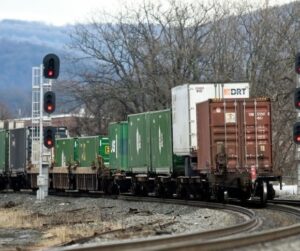While the American public was engrossed in the meanderings of a Chinese spy balloon over the United States, a more potentially dangerous incident occurred. On Feb. 3, at about 9 p.m., 50 cars operated by the Norfolk Southern railroad derailed in East Palestine, OH, upending several tanker-loads of vinyl chloride and butyl acrylate. Both chemicals are used in the production of plastics and resins. After the derailment, crews raced to the scene, where some of the cars were on fire. The accident took place near town, and authorities warned those in nearby neighborhoods to immediately leave the area “or face the possibility of death” from the toxic spill. The Associated Press reported on the scene:
“Flames and black smoke billowed high into the sky from the derailment site late in the afternoon, about an hour after authorities said the controlled release would begin. The slow release of vinyl chloride from five rail cars into a trough that was then ignited created a large plume above the village of East Palestine, but authorities said they were closely monitoring the air quality.”
At the time of the accident, the safety features of the rail car were working. But, according to hazardous materials experts, vinyl chloride is particularly dangerous when it escapes into the atmosphere and combines with water vapor. “Vinyl chloride in and of itself is cancerous. Some of the other stuff is just as bad. The hydrogen chloride is bad enough that when you inhale it, it mixes with the water in your lungs and you could have acid burns in your lungs,” hazmat specialist Silverio Caggiano told television station WKBN. And the local fire chief continued to warn citizens not to enter the affected area because it was still dangerous.
Toxic Spill Catching Fire Is the Worry
The real worry was that the vinyl chloride would catch fire, and the smoke would quickly spread the chemical through the air. This video provides a visual record of the wreckage of the cars and the extent of the fire. Reports from the scene explain the National Transportation Safety Board is investigating the cause of the derailment and initially suggest mechanical failure. However, a definitive cause will be explained at the completion of the accident analysis. Currently, the Evansville Water and Sewer Utility [EWSU] is monitoring water supplies and intake from the Ohio River. “A statement … by EWSU officials noted that the utility was notified of the spill by the Ohio River Valley Water Sanitation Commission (ORSANCO) the same night it happened and that EWSU workers are also monitoring data,” the Evansville Courier & Press reported. However, not everyone at this point is comfortable that monitoring the problem is sufficient.

(Photo by Ben Hasty/MediaNews Group/Reading Eagle via Getty Images)
Citizens Have Long-Term Health Concerns Over Toxic Spill
Some citizens in the area were not convinced that the incident was under control. It’s been a week since specialists at the accident site began the controlled release of the toxic vinyl chloride. The resulting smoke has locals worried since the acrid fumes from the burning chemicals can cause serious health issues. “Vinyl chloride exposure is associated with an increased risk of a rare form of liver cancer (hepatic angiosarcoma), as well as primary liver cancer (hepatocellular carcinoma), brain and lung cancers, lymphoma, and leukemia,” according to the National Cancer Institute.
No one knows when the dangerous spill area will return to normal. If there is any positive element in the hazmat discharge into the environment, it is that the tank cars carrying the chemicals were designed not to rupture. And they did not. Everyday commerce in America depends on the critical supply chain that moves dangerous products safely. When accidents happen, like the one in East Palestine, quick remediation is vital. But long-term health issues can remain an ever-present threat.
The views expressed are those of the author and not of any other affiliation.
Do you have an opinion about this article? We’d love to hear it! If you send your comments to [email protected], we might even publish your edited remarks in our new feature, LN Readers Speak Out. Remember to include the URL of the article along with your name, city, and state.
Please respect our republishing guidelines. Republication permission does not equal site endorsement. Click here.

